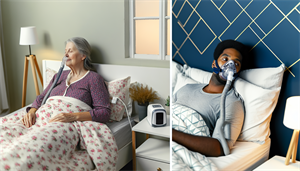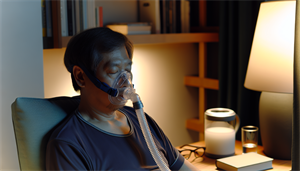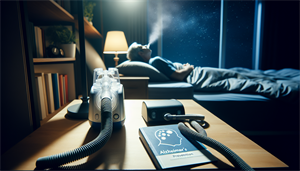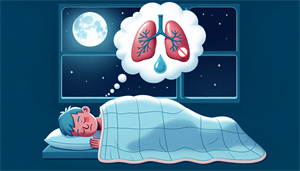Have you ever wondered why a good night’s sleep is so crucial? Poor sleep can affect more than just your mood and energy levels. It can have serious implications for your cognitive health.
What’s even more concerning is that chronic sleep disorders, like sleep apnea and Alzheimer’s, may contribute to cognitive decline – a connection often overlooked.
Understanding and addressing these conditions can significantly improve health outcomes, highlighting the importance of sound sleep and its role in maintaining brain health.
Key Takeaways
-
Sleep apnea, characterized by sleep interruptions and reduced oxygen to the brain, is linked to cognitive decline and Alzheimer’s disease through mechanisms such as sleep fragmentation and intermittent hypoxia.
-
Common risk factors for both sleep apnea and Alzheimer’s include age, gender, obesity, smoking, sedative/alcohol use, and family history, with diagnostic challenges for Alzheimer’s patients due to overlapping symptoms and pathological complexities.
-
Treatment options for sleep apnea, such as CPAP therapy, alternative treatments like BiPAP and Auto CPAP, lifestyle changes, and preventive measures, may improve cognitive health and potentially slow Alzheimer’s progression.
The Sleep Apnea-Alzheimer's Connection

Sleep Apnea, a prevalent sleep disorder, involves continual episodes of shallow or paused breathing during sleep, which results in sleep interruptions and insufficient oxygen supply to the brain. This chronic condition, including central sleep apnea, has been associated with a myriad of health complications, such as heart disease, stroke, and cognitive decline. The connection between sleep apnea and cognitive decline, particularly Alzheimer’s disease, has garnered significant attention in recent years. Sleep disordered breathing, such as sleep apnea, can have a profound impact on overall health and well-being.
Two main mechanisms through which sleep apnea exacerbates cognitive decline and Alzheimer’s disease are sleep fragmentation and intermittent hypoxia. Sleep fragmentation refers to frequent awakenings or shifts between stages of sleep, leading to poor sleep quality. On the other hand, intermittent hypoxia refers to episodes of significantly reduced or completely paused airflow during sleep, causing a drop in blood oxygen levels. Both of these processes have serious implications for brain health and function.
These processes, which are fundamental to severe obstructive sleep apnea, have been implicated in generating neurodegenerative changes associated with Alzheimer’s disease. Sleep deprivation is associated with increased levels of beta-amyloid and tau proteins in the brain, which are related to the development of Alzheimer’s disease. Thus, understanding and managing sleep apnea is not just about improving sleep quality but also about mitigating risks for cognitive decline and Alzheimer’s disease.
Sleep Fragmentation
Often seen in severe sleep apnea, sleep fragmentation involves recurrent awakenings or transitions to lighter sleep stages, disrupting the deep sleep that is essential for proper rest. This disruption in sleep patterns can result in elevated levels of Alzheimer’s-related proteins in the brain, leading to adverse effects on memory and cognitive function in obstructive sleep apnea patients.
As a consequence of sleep fragmentation, there is a rise in the levels of two Alzheimer’s-related proteins: amyloid and amyloid-beta. Individuals suffering from sleep fragmentation may present signs and symptoms such as:
-
increased objective sleepiness
-
decreased psychomotor performance
-
degraded mood
-
loud disruptive snoring
-
witnessed apneas during sleep
-
excessive daytime sleepiness
-
waking up feeling tired
-
headaches upon waking
-
dry or sore throat
-
trouble with concentration.
Therefore, tackling sleep fragmentation is crucial in managing sleep apnea and its potential cognitive impact.
Intermittent Hypoxia

Intermittent hypoxia, also a result of sleep apnea, involves periods of drastically diminished blood oxygen levels. These episodes can lead to neurological impairment, diminished brain function, and consequently, elevate the susceptibility to Alzheimer’s disease.
Intermittent hypoxia in individuals with sleep disorders like sleep apnea is a result of diminished upper airway dilating muscle activity, leading to recurrent pharyngeal collapse during sleep. This leads to episodes of apnea and substantial oxygen deprivation, which can adversely impact the brain and heart. Furthermore, intermittent hypoxia can result in brain injury through the process of oxidative stress and inflammation, especially in cases of chronic or severe hypoxia, which is often seen in obstructive sleep apnoea.
Patients with intermittent hypoxia due to sleep apnea may exhibit various symptoms including:
-
Snoring
-
Visible upper airway collapse
-
Systemic inflammation
-
Mild hypercapnia
-
Frequent awakenings during sleep
-
Excessive daytime fatigue
-
Mood alterations
Identifying Risk Factors for Both Conditions
Recognizing common risk factors for sleep apnea and Alzheimer’s disease is crucial for comprehending and handling these conditions. Some of these shared risk factors include:
-
Age
-
Gender
-
Obesity
-
Smoking
-
Sedatives/alcohol use
-
Family history
In terms of gender, there is a higher prevalence of sleep apnea in males compared to females. However, post-menopause, women are three times more likely to develop sleep apnea, suggesting gender-specific risk changes with age. Sleep apnea is also associated with an increased risk of cardiovascular disease.
Lifestyle factors also play a critical role. Obesity, smoking, and sedative/alcohol use are known to elevate the risk of untreated sleep apnea, which in turn can contribute to the development of Alzheimer’s disease. Understanding these risk factors can help individuals make informed decisions and take preventive measures to mitigate the risks associated with sleep apnea and Alzheimer’s disease.
Age and Gender
Advanced age is associated with a heightened vulnerability to both obstructive sleep apnea syndrome and Alzheimer’s disease. Sleep apnea is more prevalent in men aged 45 to 64 and women over 50, while late-onset Alzheimer’s typically manifests in older individuals. The higher prevalence of sleep apnea in males is often more severe than in females. Additionally, factors such as being overweight or post-menopause can elevate the risk of sleep apnea in women. Sleep medicine can help diagnose and treat sleep apnea in both genders.
Furthermore, approximately two-thirds of all Alzheimer’s patients are women, suggesting a higher prevalence of Alzheimer’s disease among women. This highlights the complexity and interplay of age and gender in the development and progression of both sleep apnea and Alzheimer’s disease.
Lifestyle Factors
Lifestyle factors like obesity, smoking, and the use of sedatives or alcohol play a significant role in the risk of developing sleep apnea and, consequently, Alzheimer’s disease. Obesity is associated with an increased risk of sleep apnea, and it also correlates with cognitive deficits and reduced brain volume, further contributing to the heightened risk of Alzheimer’s disease.
Smoking is associated with an increased probability of developing sleep apnea, which in turn can contribute to cognitive decline and raise the risk of developing Alzheimer’s disease. Similarly, the utilization of sedatives or alcohol intake can exacerbate obstructive sleep apnea and amplify the severity of its symptoms. Given the association between sleep apnea and a heightened risk of Alzheimer’s disease, these substances can indirectly impact the risk of developing Alzheimer’s.
Diagnosing Sleep Apnea in Alzheimer's Patients
Determining sleep apnea, especially among individuals with Alzheimer’s, can be challenging. The widely accepted method for diagnosing sleep apnea is a sleep study called polysomnography. This comprehensive test monitors various physiological parameters such as:
-
heart rate
-
respiration
-
leg movement
-
oxygen and carbon dioxide levels
-
brain waves
-
eye movements
However, diagnosing sleep apnea in Alzheimer’s patients is complicated by the unknown mechanisms underlying Alzheimer’s disease affecting the development of diagnostic methods and excessive neuronal activity that may complicate the assessment. Despite these challenges, polysomnography has proven to be effective in diagnosing sleep apnea in Alzheimer’s patients, providing detailed insights into sleep alterations in Alzheimer’s disease and their connection to sleep apnea.
Early identification and treatment of sleep apnea in Alzheimer’s patients can contribute to improved cognitive function, better sleep quality, and an overall better quality of life. Hence, there is a need for increased awareness and routine screening for sleep apnea, particularly in older adults and those at risk for Alzheimer’s disease.
Treatment Options for Sleep Apnea to Improve Cognitive Health

Upon diagnosis of sleep apnea, suitable treatment strategies can be implemented to manage the disorder and enhance cognitive health. The primary treatment option for sleep apnea is the use of a Continuous Positive Airway Pressure (CPAP) device. This machine aids in the treatment of sleep apnea by maintaining an open airway through the delivery of pressurized air, thereby enhancing breathing during sleep.
In addition to CPAP, there are alternative treatments like Cognitive Behavioral Therapy for Insomnia (CBT-I) that have shown effectiveness in addressing sleep apnea and enhancing cognitive health. Moreover, incorporating healthy lifestyle modifications such as weight management, abstaining from alcohol and sedatives, ceasing smoking, and utilizing positional therapy such as sleeping on one’s side can supplement other sleep apnea treatments and promote enhanced cognitive function.
Addressing sleep apnea not only improves the quality of sleep and overall health but also has the potential to:
-
Slow down the cognitive decline associated with Alzheimer’s disease
-
Improve memory and cognitive function
-
Reduce the risk of developing Alzheimer’s disease
-
Enhance overall brain health
This highlights the importance of timely diagnosis and treatment of sleep apnea, particularly in individuals at risk for or diagnosed with Alzheimer’s disease.
Continuous Positive Airway Pressure (CPAP)
A CPAP machine is a prevalent and effective treatment for sleep apnea. It operates by delivering pressurized air through the airway using tubing and a mask, thereby facilitating uninterrupted breathing and preventing interruptions in breathing while sleeping. This alleviates symptoms of snoring and sleep apnea, potentially leading to improved cognitive function and deceleration of Alzheimer’s progression.
CPAP machines are effective in mitigating the neuropsychological deficits linked to sleep apnea. The benefits of CPAP therapy include:
-
Maintaining an open airway during sleep, allowing for normal breathing
-
Improving sleep quality
-
Enhancing daytime alertness
-
Improving cognitive function
-
Significantly enhancing the quality of life for individuals with sleep apnea.
Alternative Therapies
While CPAP is the primary treatment for sleep apnea, it’s not the sole option. For some individuals, alternative treatments like BiPAP, Auto CPAP, and dental appliances may be more suitable or manageable.
BiPAP, or bilevel positive airway pressure therapy, is a mechanical ventilation method that uses a mask to address sleep apnea, particularly beneficial for individuals with obstructive sleep apnea. Auto CPAP machines, on the other hand, are designed to automatically adjust the air pressure in real-time, offering a personalized treatment that responds to the individual’s breathing patterns.
These alternative therapies provide viable options for those who may not tolerate CPAP therapy and can be equally effective in managing sleep apnea and improving cognitive health.
Lifestyle Changes
Besides medical interventions, lifestyle modifications can notably influence the management of sleep apnea and cognitive health. One of the key lifestyle modifications is weight management, as obesity is a significant risk factor for sleep apnea.
Other lifestyle modifications to consider for managing obstructive sleep apnea (OSA) include:
-
Abstaining from alcohol and sedatives, which can exacerbate the condition and amplify its symptoms
-
Cessation of smoking, which can enhance sleep quality by decreasing nicotine stimulation and inflammation in the upper airway
-
Positional therapy, such as sleeping on one’s side, which can help open up the airways and reduce the severity of sleep apnea.
Incorporating these lifestyle changes can greatly supplement sleep apnea treatments, lead to improved sleep quality, and promote enhanced cognitive function.
The Impact of Sleep Apnea Treatment on Alzheimer's Progression

The management of sleep apnea carries substantial implications for Alzheimer’s progression. Using a CPAP machine to treat sleep apnea can improve cognition in Alzheimer’s patients by stabilizing β-amyloid and T-tau proteins, which are associated with the disease.
Research has demonstrated that CPAP therapy can normalize Alzheimer’s disease biomarkers in cerebrospinal fluid (CSF), including β-amyloid and T-tau proteins, which may lead to potential improvement in cognitive deficits. This highlights the potential of CPAP therapy not only in managing sleep apnea but also in addressing the cognitive decline associated with Alzheimer’s disease.
Further research has indicated a noteworthy enhancement in cognition following CPAP therapy. Sustained utilization of CPAP seems to decelerate the decline in cognition, sleep, and mood among individuals with Alzheimer’s disease and obstructive sleep apnea. This underscores the importance of early and ongoing treatment of sleep apnea in managing Alzheimer’s disease.
Preventive Measures for Sleep Apnea and Alzheimer's Disease

The adage ‘Prevention is better than cure’ rings true for sleep apnea and Alzheimer’s disease too. Implementing good sleep hygiene, adopting a healthy lifestyle, and proactively addressing sleep apnea can contribute to lowering the likelihood of developing Alzheimer’s disease.
Early identification and management of sleep apnea may have a positive impact on preventing preclinical Alzheimer’s disease and can contribute to slowing cognitive decline. This involves regular screenings, especially in older adults and those with risk factors for Alzheimer’s disease.
Furthermore, engaging in supervised exercise training has shown potential to lessen the severity of obstructive sleep apnea and enhance brain function. Incorporating biofeedback exercises, such as daily breathing routines, may potentially lower the risk of developing Alzheimer’s disease. Therefore, a proactive approach towards maintaining good sleep hygiene and a healthy lifestyle can go a long way in preventing sleep apnea and Alzheimer’s disease.
Summary
Understanding the connection between sleep apnea and Alzheimer’s disease is crucial in addressing these conditions effectively. The impact of sleep apnea on cognitive decline is primarily due to sleep fragmentation and intermittent hypoxia, which affect brain health and function. Identifying shared risk factors such as age, gender, obesity, smoking, and sedative/alcohol use can aid in timely prevention and management. Polysomnography remains the standard method for diagnosing sleep apnea, and treatments like CPAP therapy, alternative therapies, and lifestyle changes can significantly improve cognitive health. By addressing sleep apnea, we can not only improve sleep quality and overall health but also potentially slow down the cognitive decline associated with Alzheimer’s disease.
Frequently Asked Questions
Is there a link between sleep apnea and dementia?
Yes, there is a link between sleep apnea and dementia, as obstructive sleep apnea is common in Alzheimer's patients and increases the risk of developing dementia. This can create a cycle of sleep deprivation and worsening brain function.
Does sleep apnea cause cognitive decline?
Yes, sleep apnea can cause cognitive decline due to the prolonged periods of breathlessness during sleep leading to a lack of oxygen and potential damage to the brain's health. This is supported by a study that involved healthy participants without comorbidities often linked to sleep apnea's impact on cognition.
What is the average age of death for sleep apnea patients?
The average age of death for sleep apnea patients is approximately 66.8 years. This is based on the median age at death observed in a study.
How are sleep fragmentation and intermittent hypoxia related to Alzheimer's disease?
Sleep fragmentation and intermittent hypoxia, common in severe sleep apnea, can lead to an increase in Alzheimer's-related proteins in the brain, resulting in cognitive decline.
What are some common risk factors for both sleep apnea and Alzheimer's disease?
Both sleep apnea and Alzheimer's disease share common risk factors such as age, gender, obesity, smoking, sedatives/alcohol use, and family history. These factors can increase the likelihood of developing both conditions.


